#Indigenous rights
Explore tagged Tumblr posts
Text
Indigenous people from across the globe gather in Brazil, call for land demarcation, environmental protection

Thousands of Indigenous people from as far off as Australia gathered in Brazil’s capital, Brasília, this week to voice their demands for territorial and human rights.
The largest mobilization of Indigenous peoples in the country, “Acampamento Terra Livre” (Free Land Camp), drew an estimated 8,000 participants from across Brazil, neighboring Amazon countries as well as Indigenous peoples from the Pacific Islands and Australia. Participants included members of at least 135 Indigenous ethnic groups.
Organized annually since 2004 by the Articulation of Indigenous Peoples of Brazil (APIB), the event has become a powerful platform for Indigenous communities. This year’s agenda focused on two main issues: the demarcation of Indigenous lands and the expansion of basic services within their territories.
In Brazil, land demarcation is a process to guarantee land possession and exclusive use of its natural resources to the Indigenous peoples who live on it. The process ground to a halt during the administration of Jair Bolsonaro, but has been slowly re-initiated by current President Luiz Inácio Lula da Silva.
Continue reading.
#brazil#brazilian politics#politics#environmentalism#indigenous rights#image description in alt#mod nise da silveira
33 notes
·
View notes
Text
Here is my story. I find it imperative that I speak up about what I endured the last 15 years of my life. This is something that has gone on for too long and I refuse to stay silent any longer. I love and appreciate everyone who has been a support to me during these times. I am finally free. I want to share what I went through.
#indigenous#culture#important#fypシ#fypage#indigenous russia#indigenous russian#colonization#russia#landback#land back#native rights#native people#native siberia#native siberian#mmiwg2s#mmiwawareness#mmiw#human trafficking#drug trafficking#abuse recovery#tw abuse#fyppage#fypツ#fyp#tumblr fyp#important read#important post#important videos#indigenous rights
19 notes
·
View notes
Text
West Papua’s Indigenous people have called for a boycott of KitKat, Smarties and Aero chocolate, Oreo biscuits and Ritz crackers, and the cosmetics brands Pantene and Herbal Essences, over alleged ecocide in their territory.
All are products that contain palm oil and are made, say the campaigners, by companies that source the ingredient directly from West Papua, which has been under Indonesian control since 1963 and where thousands of acres of rainforest are being cleared for agriculture.
More than 90 West Papuan tribes, political organisations and religious groups have endorsed the call for a boycott, which they say should continue until the people of West Papua are given the right to self-determination.
Raki Ap, a spokesperson for the United Liberation Movement for West Papua, which is overseeing the call, said: “These products are linked to human rights violations, in the first place, because West Papuans are being forced, with violence, to get off the land where they’ve lived for thousands of years, which has now resulted in ecocide.
“This is a signal to the countries who are dealing with Indonesia, especially those in the Pacific region, to take notice of who they’re dealing with and how they are basically allowing Indonesia to continue the colonial project in West Papua, the human rights violations, and also ecocide.”
West Papuans say more than 500,000 of their people have been killed by the occupation in the past six decades, while millions of acres of their ancestral lands have been destroyed for corporate profit. Indonesia, already the world’s largest palm oil exporter, is now breaking ground in West Papua on the world’s biggest single palm oil plantation, as well as a sugar cane and biofuel plantation that will be the largest deforestation project ever launched.
“West Papuans’, especially the ULMWP, position is very clear: we are a modern-day colony,” said Ap, speaking from the Netherlands.
“Indonesia hijacked the right to self-determination in 1962 when the Netherlands and Indonesia signed an agreement without any consultation in West Papua … After that, in 1969, there was a so-called referendum, which wasn’t fair, which wasn’t under international law, one man, one vote: just 1,025 men were handpicked at gunpoint to vote for integration to Indonesia.
“So this is the foundation of the Indonesia’s colonial project. When we became part of Indonesia against our will, basically the genocide unfolded.”
#palm oil#nestle#mondelez#proctor and gamble#west papua#indonesia#ecocide#colonialism#indigenous rights#deforestation
12K notes
·
View notes
Text
"In a historic “first-of-its-kind” agreement the government of British Colombia has acknowledged the aboriginal ownership of 200 islands off the west coast of Canada.
The owners are the Haida nation, and rather than the Canadian government giving something to a First Nation, the agreement admits that the “Xhaaidlagha Gwaayaai” or the “islands at the end of world,” always belonged to them, a subtle yet powerful difference in the wording of First Nations negotiating.
BC Premier David Eby called the treaty “long overdue” and once signed, will clear the way for half a million hectares (1.3 million acres) of land to be managed by the Haida.
Postal service, shipping lanes, school and community services, private property rights, and local government jurisdiction, will all be unaffected by the agreement, which will essentially outline that the Haida decide what to do with the 200 or so islands and islets.
“We could be facing each other in a courtroom, we could have been fighting each other for years and years, but we chose a different path,” said Minister of Indigenous Relations of BC, Murray Rankin at the signing ceremony, who added that it took creativity and courage to “create a better world for our children.”
Indeed, making the agreement outside the courts of the formal treaty process reflects a vastly different way of negotiating than has been the norm for Canada.
“This agreement won’t only raise all boats here on Haida Gwaii – increase opportunity and prosperity for the Haida people and for the whole community and for the whole province – but it will also be an example and another way for nations – not just in British Columbia, but right across Canada – to have their title recognized,” said Eby.
In other words, by deciding this outside court, Eby and the province of BC hope to set a new standard for how such land title agreements are struck."
-via Good News Network, April 18, 2024
#canada#indigenous#first nations#haida#british columbia#canadian politics#land back#indigenous peoples#indigenous rights#indigenous land
18K notes
·
View notes
Text
Genocide experts warn that India is about to genocide the Shompen people
Who are the Shompen?
The Shompen are an indigenous culture that lives in the Great Nicobar Island, which is nowadays owned by India. The Shompen and their ancestors are believed to have been living in this island for around 10,000 years. Like other tribes in the nearby islands, the Shompen are isolated from the rest of the world, as they chose to be left alone, with the exception of a few members who occasionally take part in exchanges with foreigners and go on quarantine before returning to their tribe. There are between 100 and 400 Shompen people, who are hunter-gatherers and nomadic agricultors and rely on their island's rainforest for survival.
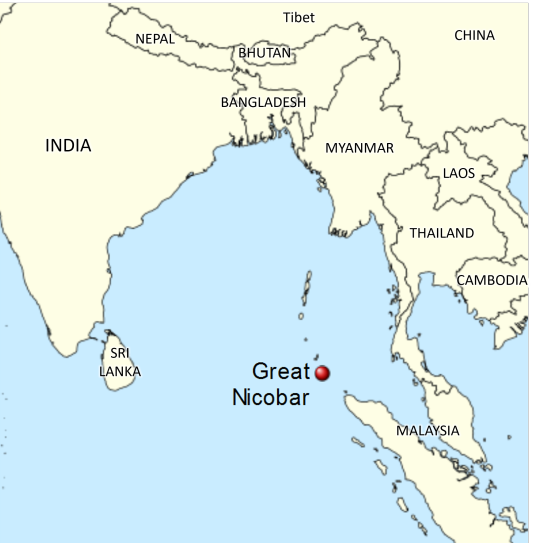
Why is there risk of genocide?
India has announced a huge construction mega-project that will completely change the Great Nicobar Island to turn it into "the Hong Kong of India".
Nowadays, the island has 8,500 inhabitants, and over 95% of its surface is made up of national parks, protected forests and tribal reserve areas. Much of the island is covered by the Great Nicobar Biosphere Reserve, described by UNESCO as covering “unique and threatened tropical evergreen forest ecosystems. It is home to very rich ecosystems, including 650 species of angiosperms, ferns, gymnosperms, and bryophytes, among others. In terms of fauna, there are over 1800 species, some of which are endemic to this area. It has one of the best-preserved tropical rain forests in the world.”
The Indian project aims to destroy this natural environment to create an international shipping terminal with the capacity to handle 14.2 million TEUs (unit of cargo capacity), an international airport that will handle a peak hour traffic of 4,000 passengers and that will be used as a joint civilian-military airport under the control of the Indian Navy, a gas and solar power plant, a military base, an industrial park, and townships aimed at bringing in tourism, including commercial, industrial and residential zones as well as other tourism-related activities.
This project means the destruction of the island's pristine rainforests, as it involves cutting down over 852,000 trees and endangers the local fauna such as leatherback turtles, saltwater crocodiles, Nicobar crab-eating macaque and migratory birds. The erosion resulting from deforestation will be huge in this highly-seismic area. Experts also warn about the effects that this project will have on local flora and fauna as a result of pollution from the terminal project, coastal surface runoff, ballasts from ships, physical collisions with ships, coastal construction, oil spills, etc.
The indigenous people are not only affected because their environment and food source will be destroyed. On top of this, the demographic change will be a catastrophe for them. After the creation of this project, the Great Nicobar Island -which now has 8,500 inhabitants- will receive a population of 650,000 settlers. Remember that the Shompen and Nicobarese people who live on this island are isolated, which means they do not have an immune system that can resist outsider illnesses. Academics believe they could die of disease if they come in contact with outsiders (think of the arrival of Europeans to the Americas after Christopher Columbus and the way that common European illnesses were lethal for indigenous Americans with no immunization against them).
And on top of all of this, the project might destroy the environment and the indigenous people just to turn out to be useless and sooner or later be abandoned. The naturalist Uday Mondal explains that “after all the destruction, the financial viability of the project remains questionable as all the construction material will have to be shipped to this remote island and it will have to compete with already well-established ports.” However, this project is important to India because they want to use the island as a military and commercial post to stop China's expansion in the region, since the Nicobar islands are located on one of the world's busiest sea routes.
Last year, 70 former government officials and ambassadors wrote to the Indian president saying the project would “virtually destroy the unique ecology of this island and the habitat of vulnerable tribal groups”. India's response has been to say that the indigenous tribes will be relocated "if needed", but that doesn't solve the problem. As a spokesperson for human rights group Survival International said: “The Shompen are nomadic and have clearly defined territories. Four of their semi-permanent settlements are set to be directly devastated by the project, along with their southern hunting and foraging territories. The Shompen will undoubtedly try to move away from the area destroyed, but there will be little space for them to go. To avoid a genocide, this deadly mega-project must be scrapped.”
On 7 February 2024, 39 scholars from 13 countries published an open letter to the Indian president warning that “If the project goes ahead, even in a limited form, we believe it will be a death sentence for the Shompen, tantamount to the international crime of genocide.”
How to help
The NGO Survival International has launched this campaign:
From this site, you just need to add your name and email and you will send an email to India's Tribal Affairs Minister and to the companies currently vying to build the first stage of the project.
Share it with your friends and acquittances and on social media.
Sources:
India’s plan for untouched Nicobar isles will be ‘death sentence’ for isolated tribe, 7 Feb 2024. The Guardian.
‘It will destroy them’: Indian mega-development could cause ‘genocide’ and ‘ecocide’, says charity, 8 Feb 2024. Geographical.
Genocide experts call on India's government to scrap the Great Nicobar mega-project, Feb 2024. Survival International.
The container terminal that could sink the Great Nicobar Island, 20 July 2022. Mongabay.
[Maps] Environmental path cleared for Great Nicobar mega project, 10 Oct 2022. Mongabay.
#shompen#genocide#stop genocide#india#indigenous#indigenous peoples#indigenous rights#human rights#anthropology#stateless nations#end occupation#andaman and nicobar islands#nicobar islands#great nicobar#💬#asia#geopolitics#ecocide#sustainability
23K notes
·
View notes
Text
Things the Biden-Harris Administration Did This Week #39
October 18-25 2024.
President Biden issued the first presidential apology on behalf of the federal government to America's Native American population for the Indian boarding school policy. For 150 years the federal government operated a system of schools which aimed to destroy Native culture through the forced assimilation of native children. At these schools students faced physical, emotional, and sexual abuse, and close to 1,000 died. The Biden-Harris Administration has been historic for Native and Tribal rights. From the appointment of the first ever Native American cabinet member, Secretary of the Interior Deb Haaland, to the investment of $46 billion dollars on tribal land, to 200 new co-stewardship agreements. The last 4 years have seen a historic investment in and expansion of tribal rights.
The Biden-Harris Administration proposed a new rule which would make contraceptive medication (the pill) free over the counter with most Insurance. The new rule would ban cost sharing for contraception products, including the pill, condoms, and emergency contraception. On top of over the counter medications, the new rule will also strength protections for prescribed contraception without cost sharing as well.
The EPA announced its finalized rule strengthening standards for lead paint dust in pre-1978 housing and child care facilities. There is no safe level of exposure to lead particularly for children who can suffer long term developmental consequences from lead exposure. The new standards set the lowest level of lead particle that can be identified by a lab as the standard for lead abatement. It's estimated 31 million homes built before the ban on lead paint in 1978 have lead paint and 3.8 million of those have one or more children under the age of 6. The new rule will mean 1.2 million fewer people, including over 300,000 children will not be exposed to lead particles every year. This comes after the Biden-Harris Administration announced its goal to remove and replace all lead pipes in America by the end of the decade.
The Department of Transportation announced a $50 million dollar fine against American Airlines for its treatment of disabled passengers and their wheelchairs. The fine stems from a number of incidences of humiliating and unfair treatment of passages between 2019 and 2023, as well as video documented evidence of mishandling wheelchairs and damaging them. Half the fine will go to replacing such damaged wheelchairs. The Biden administration has leveled a historic number of fines against the airlines ($225 million) for their failures. It also published a Airline Passengers with Disabilities Bill of Rights, passed a new rule accessible lavatories on aircraft, and is working on a rule to require airlines to replace lost or damaged wheelchairs with equal equipment at once.
The Department of Energy announced $430 million dollars to help boost domestic clean energy manufacturing in former coal communities. This invests in projects in 15 different communities, in places like Texas, West Virginia, Pennsylvania, Tennessee, Kentucky, and Michigan. The plan will bring about 1,900 new jobs in communities struggling with the loss of coal. Projects include making insulation out of recycled cardboard, low carbon cement production, and industrial fiber hemp processing.
The Department of Transportation announced $4.2 billion in new infrastructure investment. The money will go to 44 projects across the country. For example the MBTA will get $400 million to replace the 92 year old Draw 1 bridge and renovate North Station.
The Department of Transportation announced nearly $200 million to replace aging natural gas pipes. Leaking gas lines represent a serious public health risk and also cost costumers. Planned replacements in Georgia and North Carolina for example will save the average costumer there over $900 on their gas bill a year. Replacing leaking lines will also remove 1,000 metric tons of methane pollution, annually.
The Department of the Interior announced $244 million to address legacy pollution in Pennsylvania coal country. This comes on top of $400 million invested earlier this year. This investment will help close dangerous mine shafts, reclaim unstable slopes, improve water quality by treating acid mine drainage, and restore water supplies damaged by mining.
Data shows that President Biden's Inflation Reduction Act (passed with Vice-President Harris' tie breaking vote) has saved seniors $1 billion dollars on out-of-pocket drug costs. Seniors with certain high priced drugs saw their yearly out of pocket costs capped at $3,500 for 2024. In 2024 all seniors using Medicare Part D will see their out of pocket costs capped at $2,000 for the year. It's estimated if the $2,000 cap had been in effect this year 4.6 million seniors would have hit it by June and not have had to pay any more for medication for the rest of the year.
The Department of Education announced a new proposed rule to bring student debt relief for 8 million struggling borrowers. The Biden-Harris Administration has managed despite road blocks from Republicans in Congress, the courts and law suits from Republican states to bring student loan forgiveness to 5 million Americans so far through different programs. This latest rule would take into account many financial hardships faced by people to determine if they qualify to have their student loans forgiven. The final rule cannot be finalized before 2025 meaning its fate will be decided at the election.
The Department of Agriculture announced $1.5 billion in 92 partner-driven conservation projects. These projects aim at making farming more susceptible and environmental friendly, 16 projects are about water conservation in the West, 6 support use of innovative technologies to reduce enteric methane emissions in livestock. $100 million has been earmarked for Tribal-led projects.
#Thanks Biden#Joe Biden#Kamala Harris#politics#US politics#American politics#Native Americans#indigenous rights#lead paint#reproductive rights#reproductive health#lead poisoning#disability#infastructure#climate change#drug prices
6K notes
·
View notes
Text
#land back#illinois#prarie band powtawatomi nation#american indians#indians#indigenous#native american#ndn#usa#landback#indigenous culture#indigenous history#indigenous peoples#indigenous rights#indigenous sovereignty#land rights
3K notes
·
View notes
Text
October 21, 2024 - Lidia Thorpe, an Aboriginal member of Australia's parliament told King Charles some truths as he was giving a speech in Canberra. [video]
#canberra#australia#aboriginal#lidia thorpe#anti-colonialism#indigenous#land back#indigenous rights#anti-monarchism#king charles#king charles iii#anti-monarchy#2024#video
6K notes
·
View notes
Text
If you aren't following the news here in the Pacific Northwest, this is a very, very big deal. Our native salmon numbers have been plummeting over the past century and change. First it was due to overfishing by commercial canneries, then the dams went in and slowed the rivers down and blocked the salmons' migratory paths. More recently climate change is warming the water even more than the slower river flows have, and salmon can easily die of overheating in temperatures we would consider comfortable.
Removing the dams will allow the Klamath River and its tributaries to return to their natural states, making them more hospitable to salmon and other native wildlife (the reservoirs created by the dams were full of non-native fish stocked there over the years.) Not only will this help the salmon thrive, but it makes the entire ecosystem in the region more resilient. The nutrients that salmon bring back from their years in the ocean, stored within their flesh and bones, works its way through the surrounding forest and can be traced in plants several miles from the river.
This is also a victory for the Yurok, Karuk, and other indigenous people who have relied on the Klamath for many generations. The salmon aren't just a crucial source of food, but also deeply ingrained in indigenous cultures. It's a small step toward righting one of the many wrongs that indigenous people in the Americas have suffered for centuries.
#salmon#dam removal#fish#animals#wildlife#dams#Klamath River#Klamath dams#restoration ecology#indigenous rights#Yurok Tribe#Karuk Tribe#nature#ecology#environment#conservation#PNW#Pacific Northwest
19K notes
·
View notes
Text
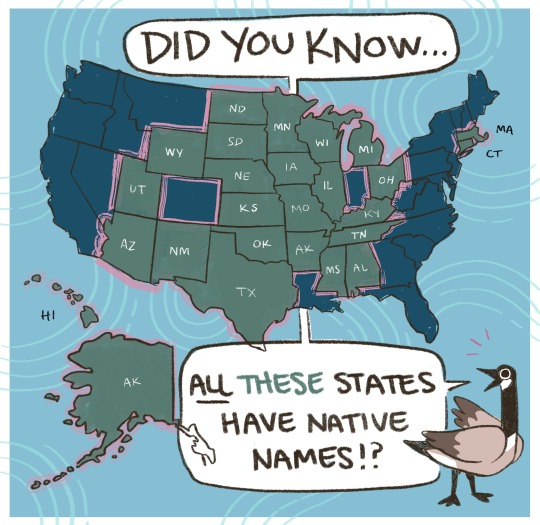
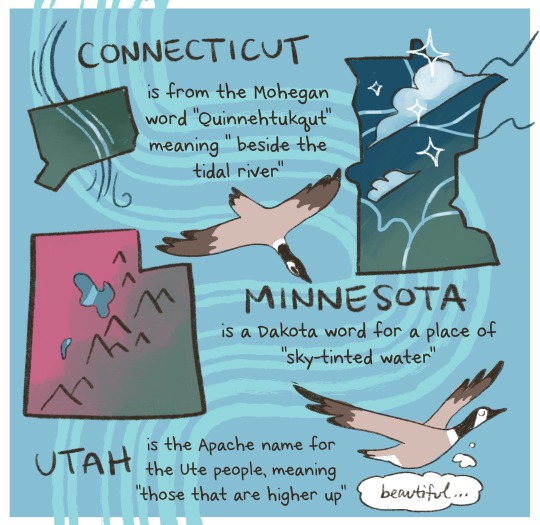
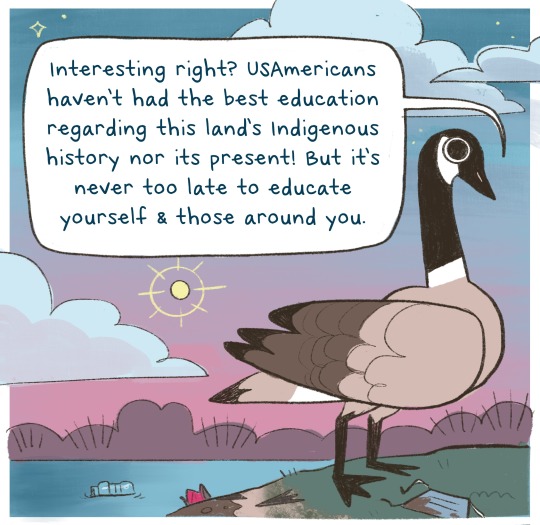
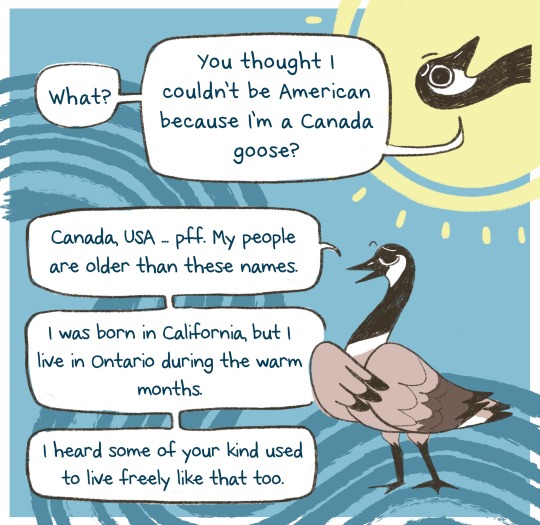
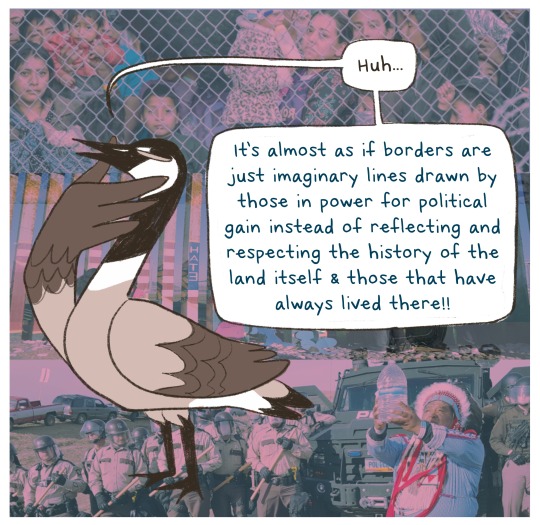
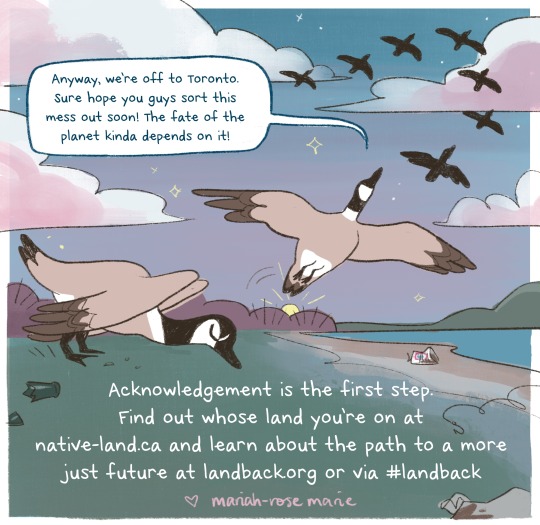
when I drew this comic 3 years ago I had NO idea how far it would reach. I'm happy to finally share a corrected version with proper abbreviations, and even MORE state names of indigenous origin ♥️
however, the goal of this comic was to inspire people to do your OWN research on indigenous history. To question everything we have been taught, and everything that has been pointedly left out. This erasure, this “forgetting”, of history is not just of the past… it is happening now. - Across so-called Canada, the US, and US-occupied islands, native women are victims of murder at 10-12x the rate of non-native people, and are the most likely to go missing without being searched for by the law. - Native reservations have the highest rates of poverty in the US, with over HALF of tribal homes with no access to clean water (with more joining this list by the year) - Native people are 6-10x more likely to be unhoused than the rest of the population, and native teens suffer suicide rates higher than any other demographic. This list of modern day genocide goes on (thank you for compiling @theindigenousanarchist <3) and yet take a look at those environmental stats!
Native people manage to do SO much for the planet as a whole - thanklessly - and with all this stacked against them. Don't even get me started on kin fighting in south america. Could you imagine if there was help? #landback is resistance to genocide, and it is the key to saving our warming earth.
So look into it and the other hashtags, cuz a cartoon goose ain't a substitute for a proper education. Love to my grandparents who always kept a map of tribal territories of turtle island on their wall, to speaking on our Tsalagi & Saponi heritage. Love & solidarity forever, happy research, and happy #indigenouspeoplesday
LANDBACK.ORG
(Also, if you care to support the artist, I'm publishing a book ! and writing another - a fantastical afroindigenous graphic novel - that I post exclusively about with tons of other art on my patreon.)
#mmiw#searchthelandfill#landback#art#comic#illustration#indigenous peoples day#rights#indigenous rights#autonomy#statistics#love#freedom#borders#history#usa#canada#turtle island#mariah-rose marie
33K notes
·
View notes
Text
Want to materially support indigenous rights within 10 minutes?
Make a submission against the New Zealand's government's proposed bill that will take away Māori rights. You don't need to be from Aotearoa New Zealand to submit.
You have until 7th January New Zealand time.
FAQ about the bill here, from a trustworthy organisation.
Guide to writing a submission here. (It's more aimed at people based in Aotearoa, but is still valuable.)
Submit here.
Examples of international submissions. Please make it your own, as repeated submissions will not be counted.
In 2025, we should all strive to support indigenous rights, and here's an easy way to do that.




2K notes
·
View notes
Text
god I'm so fucking furious at the removal of Te Reo Māori names from organisations around Aotearoa. it's a complete non-issue, every organisation has the English name directly underneath the Māori name. I have never once as an English speaker been unable to understand what an organisation is for. Winston Peters, the Deputy Prime Minister, who is literally Māori himself, said “Te Papa is a historic name but tell me this waka kotahi, how many boats have you seen going down the road?”. Waka does not just mean canoe. it means vessel, and waka kotahi (the transport agency of Aotearoa) explains this VERY SIMPLY on their official website. waka kotahi means to travel together as one. Can you see how fucking upsetting this is. A Māori person in power who is in agreement about banning his own language, being so cocky about something that he does not even understand due to the suppression of the language of his people. It makes me sick. I've seen reports from Māori people all over Aotearoa speaking out about how upset and furious they are, how decades of progress have been undone in the fight to restore the rights of their people who have for so long been oppressed and have suffered the effects of colonisation. Please share this if you can, I hate knowing how few people will hear about this, I know there is so much injustice in the world right now and it is so exhausting, I know. I love you all, keep it up.
https://waateanews.com/2023/11/27/te-reo-public-service/
#godd. I feel sick to my stomach#ask to tag#not tagging with relevant tags because I just know there are people out there who would tear me apart for this#just. share as much as you can. thank you#white prime minister after white prime minister after white prime minister#jacinda was fantastic and I appreciate her so much but godd#our government is so fucking full of pakeha officials and it really really shows#indigenous rights#colonialism#settler colonialism
11K notes
·
View notes
Text
"A recent court ruling from the Inter-American Court of Human Rights marks the first time an international judicial body has decided that indigenous peoples living in “voluntary isolation” have a right to do so, and that governments must act to ensure that right.
The ruling comes off the back of 20 years of activism challenging the Ecuadorian government’s encroachment on indigenous lands for oil drilling, and this, as well as other extractive activities like logging, were ruled to be intolerably disruptive to three groups living in voluntary isolation in the Ecuadorian Amazon.
International treaties protecting the rights of indigenous peoples have long been ratified at both the UN and the Organization of American States (OAS), but a case specifically determining whether a group living in voluntary isolation, which used to be called “uncontacted,” were guaranteed protection to allow them to continue doing so has never been ruled on.
While the United Nations Human Rights Council in 2009 and the Inter-American Commission on Human Rights in 2013 introduced guidelines and recommendations that included a right to choose self-isolation, neither were put into writing under international law, nor included in any treaty amendments.
As such, the Costa Rica-based court’s decision that nation-states, in this case Ecuador, must follow a “precautionary principle” when making decisions about future oil operations that may impede a group’s ability to live in self-isolation.
“This principle means that, even in the absence of scientific certainty regarding oil exploration and exploitation projects’ impacts on this territory, effective measures must be adopted to prevent serious or irreversible damage, which in this case would be the contact of these isolated populations,” said the court opinion, written in Spanish, and translated by Inside Climate News.
The three groups in question are the Tagaeri, Taromenane, and Dugakaeri, who are part of the overall Waorani peoples since they share cultural traditions and language.
Testimony was heard from a community leader of the Waorani, Penti Baihua, and two young women who at the ages of 2 and 6 were survivors of violent encroachment by oil workers who killed members of the girls’ group, forcibly introduced them to modernity, and displaced them to different parts of the Amazon.
In the current case, the court ruled that a protected area the size of Delaware that was established in the early 2000s to guarantee indigenous Waorani (and others) rights was created in such a way as to leave oil exploration areas outside protection, despite being the ancestral home of Baihua and his people.
A 6-mile deep buffer zone surrounding the heart of the Tagaeri, Taromenane, and Dugakaeri’s territory called the “Intangible Zone,” has been repeatedly penetrated by extractive industries, which have built roads and other “colonial” infrastructure.
The court ruled that Ecuador must honor the results of a 2023 referendum, in which voters chose to stop oil operations in that region indefinitely.
The court used the term “living in voluntary isolation” to reflect that fact that there are no unconctacted tribes on Earth, but perhaps as many as 200 who have seen evidence of modernity, and received minimal contact—perhaps from a related tribe that doesn’t live in isolation—and chose to remain without any interaction with the modern world either out of fear or self-interest."
-via March 28, 2025
#indigenous#ecuador#south america#waorani#voluntary isolation#indigenous rights#indigenous people#environmental justice#oil#oil drilling#colonialism#amazon#amazon rainforest#amazonian peoples#good news#hope
2K notes
·
View notes
Text




Rūrangi S1E4 (2020) dir. Max Currie
#rurangi#rūrangi#maori#māori#indigenous rights#language reclamation#cultural reclamation#indigenous representation#i am so sorry this screenshots are so crispy i have zero pic editing software atm my laptop is still running sierra 10.12 dont fucking @ me#alt txt added but i have no idea if i did it in a helpful way
1K notes
·
View notes

